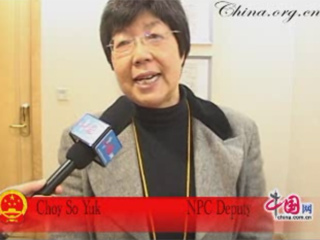By staff reporter Wang Ke and Yuan Fang
China should promote green industry to create more low-tax jobs and encourage more small and medium-sized enterprises into this field, a female NPC deputy from Hong Kong told China.org.cn.
Ms. Choy So Yuk said: "The government is now investing huge amounts of money into environmental work, which is very welcome. China should encourage more active and proactive green industry."

China continues steadfastly to promote energy conservation, emissions reduction and ecological and environmental protection. Figures from the government's 2009 Work Report indicated that China allocated 42.3 billion yuan (about $6.3 billion) to support development of 10 key energy conservation projects and environmental protection facilities in 2008.
"Last year, the government shut down small thermal power plants with a total capacity of 16.9 million kilowatts and closed 1,054 small coalmines," she said. "The country continued to eliminate outdated production facilities."
According to the Work Report of Premier Wen Jiabao, daily sewage treatment capacity rose in 2008 by an additional 11.5 million tons in urban areas, and energy consumption per unit of GDP fell by 4.6 percent in 2007.
Choy said to China.org.cn: "Over the last three years combined, total energy consumption per unit of GDP dropped by 10.1 percent."
In 2009, about 124 billion yuan ($18 billion) will be set aside for environmental protection, an increase of 19.6 billion yuan ($2.9 billion) or almost 20 percent. 49.5 billion yuan ($7.3 billion) for energy conservation and emissions reduction - an increase of 17 percent - will be spent on retrofitting energy-conserving technology, decommissioning outdated production facilities, and increasing the application of efficient, energy-conserving products and alternative-fuel powered vehicles.
"Huge sums of money have been directed to boost economic recovery. There are lots of opportunities in 2009," she said. "What we should do is decide how best to use them."
In order to save energy, reduce emissions, protect the environment, and improve the green industries, Choy offered three proposals:
Firstly, she emphasized energy conservation in the three key areas of industry, transportation and construction. "We should implement energy-conserving measures for power generators, boilers, automobiles, air-conditioners and lighting products."
Secondly, the country should embrace the development of a recycling economy and of clean energy such as nuclear, wind, and solar power.
She said: "we need to be strict in our enforcement of national standards for energy consumption and environmental protection, increasing the use of energy-saving technologies and products and promoting comprehensive utilization of resources."
Last year, over 60 million energy-efficient lights were distributed and in a second phase of the recycling economy, trials for reconditioning used parts have been launched in 14 automotive enterprises. Choy predicted this market will boom in coming years.
"Once companies seize these opportunities they will expand in the market and provide new jobs for more people," she added.
Finally, she suggested that China should improve its policies for energy conservation and environmental protection, and strictly enforce systems of standards, assessment systems and monitoring systems for energy conservation and emissions reduction.
(China.org.cn March 9, 2009)